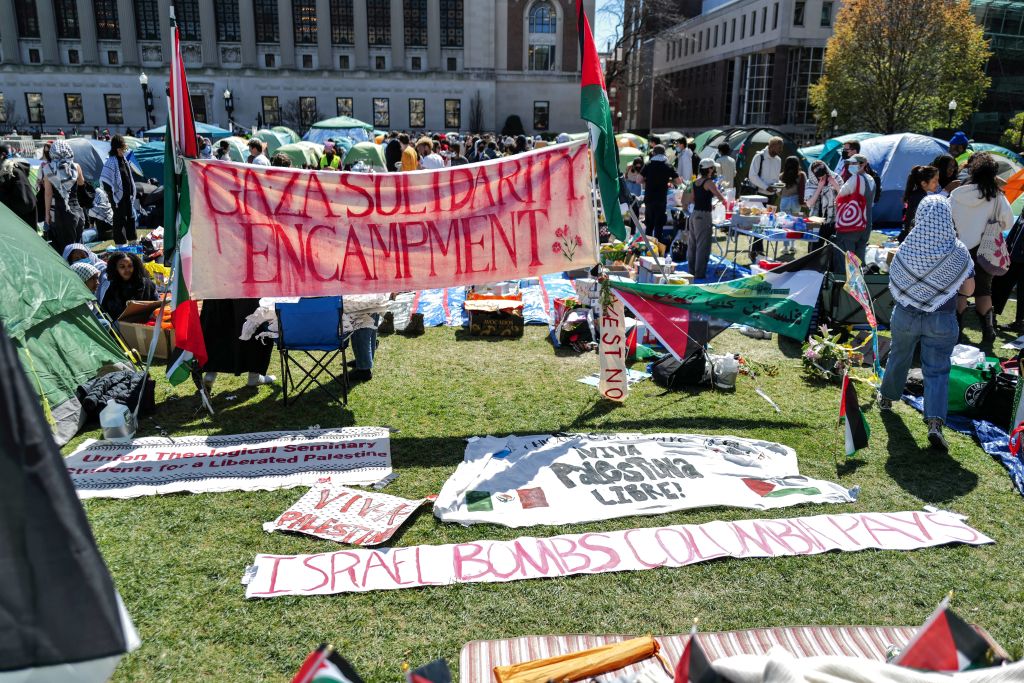Columbia Roiled By Antisemitism
Happy Tuesday! There unfortunately won’t be a new episode of Dispatch Live tonight, but our weekly live-streamed conversation will return next Tuesday at 8 p.m. ET!
Quick Hits: Today’s Top Stories
- A military base in Syria housing U.S.-led coalition troops was hit by rocket fire late Sunday night. No organization has yet claimed responsibility for the attack, the first on U.S. bases in Iraq and Syria since the U.S. conducted retaliatory strikes on Iranian-backed proxies in the region in February. On Monday morning, Iraqi officials said they are actively seeking “outlaw elements” believed responsible for firing an estimated five missiles from Iraq across the border into Syria. U.S. Central Command has not commented publicly on the aerial assault, which reportedly did not result in any casualties or injuries.
- The head of Israel’s Military Intelligence Directorate announced on Monday his intention to resign from his role over the intelligence failures that led to Hamas’ October 7 attack. An Israel Defense Forces (IDF) spokesperson said that Maj. Gen. Aharon Haliva will step down once a replacement is selected, making Haliva the first senior IDF official to resign over the October 7 attack. “I have carried that black day with me ever since,” Haliva wrote in his resignation letter. “Every day, every night.”
- Authorities in the United Kingdom charged two men on Monday—a 29-year-old and a 32-year-old—with spying on behalf of China. One of the men was reportedly employed as a researcher for Conservative Party members of parliament. Meanwhile, Germany arrested three German citizens on Monday who were also suspected of spying for Beijing. German authorities allege the men were connected to China’s Ministry of State Security—an intelligence agency—and helped gather sensitive data on marine engine machinery and illegally shipped a high-powered laser to China.
- The Supreme Court agreed on Monday to hear a case concerning the regulation of “ghost guns,” firearms easily assembled from parts or kits. The Bureau of Alcohol, Tobacco, Firearms, and Explosives sought to regulate ghost guns by requiring serial numbers for gun parts and mandating sellers of these parts to conduct background checks. In June, a federal district judge said these ghost gun restrictions cannot be applied through current federal firearm laws. The Supreme Court is expected to hear oral arguments for the case—Garland v. VanDerStok—in October. Meanwhile, the Supreme Court declined to hear a case brought forth by GOP Senate candidate Kari Lake and former state legislator Mark Finchem challenging the use of electronic voting machines in Arizona. The lawsuit was initially filed in late 2022 when the pair were campaigning for statewide offices—races both of them ultimately lost.
- The Supreme Court heard oral arguments on Monday in a case considering the constitutionality of bans on homelessness encampments in Grants Pass, Oregon—specifically examining whether the city’s bans violate the Eighth Amendment’s prohibition on “cruel and unusual punishments.” Grants Pass’ legal representatives defended the ordinances, arguing the city “relies on camping laws to protect its public spaces.” A lawyer representing homeless residents argued the city’s laws make it “physically impossible for a homeless person to live in Grants Pass” without the risk of legal repercussions. The justices seemed divided on the constitutionality of the law.
- Opening statements concluded on Monday in former President Donald Trump’s New York criminal trial involving alleged hush-money payments made to porn star Stormy Daniels and others in the lead-up to the 2016 election. David Pecker, who once published The National Enquirer tabloid, was the first witness for the prosecution and testified that his publication bought and shelved stories that might have been damaging to Trump. Judge Juan Merchan said prosecutors are permitted to reference Trump’s New York civil fraud case and the defamation case brought by E. Jean Carroll. Meanwhile, Judge Arthur Engoron accepted Trump’s $175 million bond posted in that New York civil fraud case in order to appeal the case, which he intends to do.
- A series of earthquakes rocked Taiwan early Tuesday morning, just weeks after the island experienced its most powerful earthquake in 25 years. According to the U.S. Geological Survey, the strongest earthquake had a magnitude of 6.1, while a half-dozen others ranged from magnitudes of 4.5 to 6. While it appears there were no casualties caused by this most recent wave, the earthquake from earlier this month killed 13 people and injured a thousand others.
Antisemitism Continues to Plague College Campuses

On the eve of Passover, Rabbi Elie Buechler, the director of the Orthodox Union-Jewish Learning Initiative at Columbia University, shared a warning with hundreds of Jewish students at the elite university in New York City. “The events of the last few days, especially last night, have made it clear that Columbia University’s Public Safety and the NYPD cannot guarantee Jewish students’ safety in the face of extreme antisemitism and anarchy,” he wrote in a WhatsApp message. “I would strongly recommend you return home as soon as possible and remain home until the reality in and around campus has dramatically improved.”
The “reality in and around” Columbia’s campus is bleak: An almost week-long encampment of anti-Israel and pro-Palestianian protesters on the main lawn has become a national flashpoint, drawing condemnation from leaders at all levels of government and spawning copycat encampments at elite colleges across the country. Columbia’s administration has failed to protect Jewish students from the antisemitic harassment and intimidation emanating from the tent camp and protesters surrounding the campus, once again calling into question the ability and willingness of university administrations to safeguard some of their own students.
Early Wednesday morning, hundreds of students began a protest and erected a tent city—which organizers dubbed the “Gaza Solidarity Encampment”—occupying a lawn in the middle of the school’s campus. The start of the encampment intentionally coincided with Columbia President Minouche Shafik’s testimony before Congress about the rise in antisemitism on her campus. She told lawmakers that the university doesn’t “tolerate antisemitic threats, images, and other violations.”